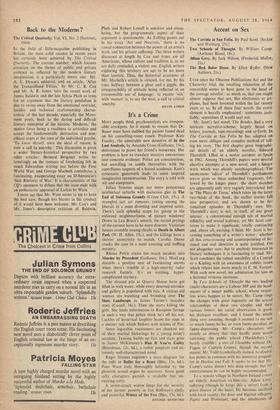Back to the Moderns?
IN the field of little-magazine publishing in Britain, the most solid success in recent years has certainly been achieved by The Critical Quarterly. The current number, which focuses attention on the theme of public and private violence as reflected by the modern literary imagination, is a particularly meaty one. Mr. A. E. Dyson's editorial, and an article, 'After the Tranquillised Fifties,' by Mr. C. B. Cox and Mr. A. R. Jones, take the recent work of James Baldwin and the' late Sylvia Plath as texts for an argument that the literary pendulum is due to swing away from the emotional restraint, lucidity and technical craftsmanship charac- teristic of .the last decade, especially the Move- ment poets, back to the daring and difficult literary enterprise of the historic 'Moderns,' the motive force being a readiness to articulate and .accept the fundamentally destructive and non- ethical urges at the core of the individual psyche. 'To know thyself, once the ideal of reason, is now a call to anarchy.' This discussion is given a wider literary-historical perspective by two other articles: Bernard Bergonzi writes in- terestingly on the tremors of foreboding felt in much Edwardian writing just before the First World War; and George Macbeth contributes a fascinating, exasperating essay on D'Annunzio's 'Sick Rhetoric of War.' It is characteristic of the CQ's openness to debate that the issue ends with an enthusiastic appraisal of Larkin by Wain.
I must say that Mr. Wain seems to me to have the best case, though less bluster in the conduct of it would have been welcome. Mr. Cox's and Mr. Jones's descriptive criticism of Baldwin,
Plath and Robert Lowell is sensitive and stimu- lating, but the programmatic aspect of their argument is questionable. As Trilling points out in his essay 'Art and Neurosis,' there is no causal connection between the power of an artist's work and his private suffering. The three writers discussed at length by Cox and Jones are all Americans, whose culture and tradition is, as we are daily reminded, a violent one. English writers exploring this territory are apt to be no more than tourists. Thus, the historical acuteness of Mr. Macbeth's article is vitiated, for me, by his tone, halfway between a gloat and a giggle, the irresponsibility of attitude being reflected in an irresponsible use of language: to equate 'sick' with 'mature' is, to say the least, a call to critical anarchy. DAVID LODGE


































 Previous page
Previous page